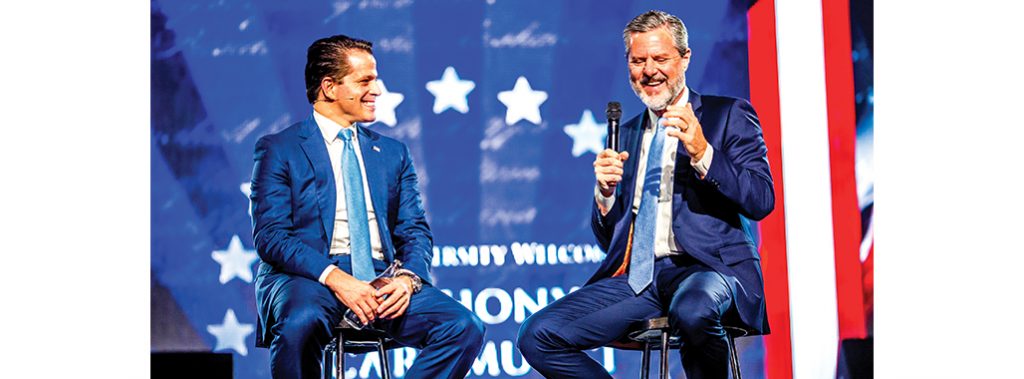- While speaking at Convocation, Scaramucci addressed his working-class background, business experience, faith and time at the White House.
- Scaramucci answered questions from Jerry Falwell and students about trade and getting involved in politics.
Former White House Communications Director and financer Anthony Scaramucci spoke at Convocation Wednesday, Nov. 1 about his experience in Washington, his personal background and gave his advice to students about facing difficult situations.
After Liberty University President Jerry Falwell introduced Scaramucci to the student body, Scaramucci addressed what he called “the elephant in the room”—the circumstances surrounding his firing from the White House after serving as communications director from July 21-31.
“Jerry left out the elephant in the room, so I’m going to address it. I was in the White House for 11 days,” Scaramucci said. “And I got fired from the White House, unfortunately, because I thought I was off the record with a journalist, and I said some things that were regrettable, that I’ve obviously apologized for, but I got fired.”
President Donald Trump fired Scaramucci after his crude comments about other White House staff members, Steve Bannon and Reince Priebus, were published in the New Yorker, according to The New York Times. In his speech, Scaramucci gave students advice on how they conduct themselves during difficult times. He stressed the need for perseverance in career choices and forgiveness in relationships.
“(God) is going to put things in front of you that are sometimes difficult, that are sometimes challenging,” Scaramucci said. “It’s up to you to man or woman up to those things and be accountable for them when you’re making a mistake.”
Scaramucci, who founded Oscar Capital Management and SkyBridge Capital after working for Goldman Sachs, then spoke about how growing up in a working-class family in Long Island, New York impacted his career path. He said that being on the campaign trail as a member of the Trump campaign’s finance committee showed him the connection Trump was making with working-class and middle-class voters.
“I was so focused on trying to become financially independent and trying to aspire to the American Dream,” Scaramucci said. “I lost touch and I lost some empathy for what was going on in my own hometown. It took a billionaire, living on Fifth Avenue in a tower, adjacent to the Tiffany’s jewelry store, to show me what was going on in my own hometown.”
Scaramucci also said he believes this generation of college students will change the current political climate for the better.
“I really have a tremendous amount of faith in your generation, that you guys are going to be part of the solution to that,” Scaramucci said. “We’re going to be less focused on things like left and right, and more focused on things like right or wrong.”
Scaramucci’s speech was followed by a Q&A session with Falwell and three students from the audience. Falwell asked Scaramucci about his view on Democratic economic policies, advice on the university’s financial decisions and Scaramucci’s personal faith.
“I’m a tremendously faithful person,” Scaramucci, who was raised Roman Catholic, said. “I definitely believe in redemption and Jesus Christ. I will tell you in your moment of despair in your life, you will find great comfort in your religion.”
In response to Falwell’s other questions, Scaramucci discussed the impact of trade policies on American jobs and praised Falwell for his business acumen in building Liberty’s financial endowment.
Blake Davis, a junior studying history, asked Scaramucci for advice for students who want to be involved in the political process.
“Start early, get involved—you would be blown away how easy it is to access the situation and get involved with these people,” Scaramucci said.
Falwell also recommended that students going into politics never read social media comments. Scaramucci added, “And don’t say curse words”—a tongue-in-cheek reference to his brief political career in the White House.
Students Ty Donnelly and Luke Noble said they thought Scaramucci handled himself well in light of his political notoriety.
“Whenever we have a political speaker at Convocation, it’s hard to catch a lot of our interest,” Noble said. “With that, I feel like he did alright. I feel like I don’t know enough about him to make a judgment on him.”
Christopher Hill, an international business major who knew of Scaramucci because of his success in finance, said he thought he addressed his firing from the White House gracefully. Hill also said he finds Scaramucci’s attitude humorous.
“He adds some lighthearted fun to politics,” Hill said. “He says his opinion, but he’s not really nasty about it. He doesn’t really drag it out and the way he does it gets the point across. He’s got that city attitude and it’s just amusing.”
